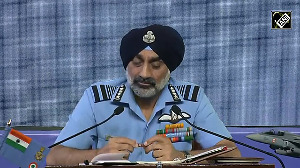On the eve of the debate in the Indian Parliament on the US-India civilian nuclear agreement, there is cautious optimism in Bush administration circles that with the Left parties' green light for the Indian government to begin negotiations with the International Atomic Energy Agency -- which got underway last week -- the US-India civilian nuclear deal is back on track.
Administration sources who, however -- now well aware of the vagaries of India's coalition politics -- scrupulously eschewed any public comment on the Left's concession lest any nuance be misperceived or misinterpreted as US pressure of interference in India's domestic politics, told rediff.com that Washington was hopeful that India and IAEA could complete a safeguards agreement by the year's end so that the US can go to bat for the deal with the Nuclear Suppliers Group early 2008.
"Our hope is that if the safeguards agreement with the IAEA can be completed by the year's end, we can immediately go to work in trying to bring about a consensus early next year and then submit the agreement to Congress before it gets too caught up in election fever," one source said.
According to the sources, Under Secretary of State for Political Affairs Nicholas Burns, the key US interlocutor of the deal was closely monitoring the India-IAEA negotiations in Vienna, was in close touch with the US Ambassador to the IAEA Gregory Shultz who has expressed confidence that the agreement will ultimately be consummated since there is an emerging consensus in the NSG in favor of the deal.
Shultz told reporters in Vienna last week that once IAEA Director-General Mohamed ElBaradei stamps his imprimatur on the safeguards agreement, then it's highly likely that several members of the NSG would go public with support for the deal.
"Once the India-specific safeguards are approved by the IAEA board then it goes to the NSG for getting exemptions for India for the civilian nuclear programme," he said.
India's Atomic Energy Commission Chief Anil Kakodkar, who kicked off the negotiations with ElBaradei last week, set forth the broad outlines of what he described as "the complex issues," before leaving for New Delhi, keeping India's negotiating team led by Ravi B Grover, director, Strategic Planning Group of the Department of Atomic Energy, to continue the negotiations.
Meanwhile, the US Chamber of Commerce's Coalition for Partnership with India, which includes the US-India Business Council as well the US-India Friendship Council, an umbrella organisation of Indian-American groups pushing for the deal, were also keeping their fingers crossed that the deal, which they believed is back on track, can move along at an even keel and the agreement submitted to Congress early 2008.
But USIBC officials too, acutely cognisant of the sensitivities that any public comment could trigger in New Delhi among the governing coalition, said they would wait for the agreement to be returned to Congress before making any of their lobbying strategies known.
They too scrupulously sought to make clear that they were not involved in any way in India's domestic politics to sway the Left front and the Communist leaders opposed to the deal and even though Graham Wisner, the India pointman for Patton Boggs, the top US lobbying firm hired by USIBC to lobby on behalf of the deal, left for India, accompanied by an aide Anurag Varma, it was said to be purely to discuss trade issues with Indian officials and the private sector, and how to reduce tariffs for US products and not to influence Indian political leaders on the deal.
But another source said that the recent visit by former defence secretary William Cohen -- who serves on the Advisory Board of the USIBC and also has his own lobbying firm called The Cohen Group -- and the meetings he had with Left and Communist leaders like West Bengal Chief Minister Buddhadeb Bhattacharya may have yielded "some little give" on the part of those opposed to the deal.
The source told rediff.com that Cohen had made clear to these Left and Communist leaders that if the deal is not consummated during the life of the Bush administration, it was highly unlikely that any Democratic administration that occupies the White House come 2009, would be favorably disposed toward the deal nor would show the kind of personal commitment President Bush has shown and all of any political capital he has left in trying to make this deal happen.
Apparently, Cohen had impressed upon those opposed to the deal, that far from pushing for this deal, the advent of a Democratic administration would most likely result in the resurrection of the Comprehensive Test Ban Treaty -- which was the major foreign policy initiative of the Clinton administration that was killed by the then Republican-controlled Senate -- and efforts to pressure India to sign it.
Community activists like North Carolina entrepreneur Swadesh Chatterjee, who founded the US-India Friendship Council solely to push the deal in Congress, and Ashok Mago, the head of the Dallas-based US-India Forum, who delivered virtually all of the Texas lawmakers in support of the enabling legislation in 2006 to facilitate the deal, were more confident that the deal would go through and said they stood ready to mobilise the community once the agreement was submitted to Congress.
They also said that it was ironical that the Communists who had earlier threatened to withdraw their support to the Congress if it pushed the deal through and made Prime Minister Manmohan Singh capitulate, now found themselves after the Nandigram issue, dependent on the Congress for their own survival because any election at this time would most likely signal their downfall, and would necessarily give an opening to the Bharatiya Janata Party, which had been hoping that the rift between the Left front and the Congress on the nuclear issue could open the way for an early election.
Chatterjee and Mago also argued that Moscow's reluctance to transfer four nuclear reactors to India under an old agreement unless there was consensus by the NSG and permission by the IAEA -- which necessarily meant that it was only the consummation of the US-India deal that would provide such an opening -- also may have taken the wind out of their sails.
"I met with all of the senior politburo of the Communist Party in West Bengal, including Jyoti Basu, Buddhadeb and also for over two hours with Somnath Chatterjee and others and strongly made the case that this deal is good for India and that this was the reason we (the Indian-American community) got so involved because we had the interests of India at heart," Chatterjee said.
"They know my credibility and where I am coming from and I think this may have made a little bit of a dent," he said and added, "so now I am hopeful that this deal will come through."
"I believe things will start moving now and definitely by early next year -- maybe by March -- it can be submitted to the Congress for an up or down vote, and I am confident that we have the votes for it," he added.
Chatterjee acknowledged that when he left for India -- which was before the Left parties gave the government its okay to begin negotiations with IAEA with the caveat that it return with the safeguards agreement for review by a Left-United Progressive Alliance Committee -- "I was very down, as you know."
In October, activists like him and several others, who had lobbied feverishly in 2006 to push through the enabling legislation to facilitate the deal in Congress, had said that they were not only deeply disappointed that Dr Singh had thrown in the towel, but that they felt betrayed and misled.
"It's so ironic that it is the Nandigram issue that is helping indirectly. It's very interesting how the domestic politics has played into it once again because the Communists now have to stick on to the coalition and can't afford to go for an election. Now it looks like the Communists need help," Mago said.
"First it was Congress who didn't want to go for election, now it's these guys and they need the Congress and it's just amazing how things change," he added.
Mago, said the ball was still in India's court "and the prime minister has to make a challenge to the people now and build up the consensus to see it through."
He said, "I really hope everybody there will realise that they will never get this kind of deal ever again. This president went out of his way and I don't think the next president will ever care to bring it to the floor."
Mago said that for the Democrats, non-proliferation was an article of faith, and also noted that "look at those 12 Senators who oppose the deal, nine of them chair Senate committees now and it's the same in the House -- seven of them chair committees. So Democrats will never let it come up again."
Thus, he argued that since the agreement when it is submitted to the Congress during the tenure of the Bush administration, would be only for an up or down vote,"this is not going to go to any committee and we've got the numbers."
"Last time it passed by over 85 per cent, and so even if there is 10 per cent defect, we've still got 75 per cent support," he said. "Of course, if there was no up or down vote and it had to go through the committees, then we would have been in trouble."
Mago, a staunch Republican, predicted that "all the Republican will vote in favor and most the Democrats, I believe will also because they all know of the importance of India in the future."
Meanwhile, the heads of the South Asia programmes at two leading think tanks in Washington too kept pressing for the consummation of the deal, warning those in India opposed to it, that if it falls through, it would adversely impact on US-India relations.
Lisa Curtis of the conservative Heritage Foundation said,"When Leftists in India warn against closer ties with the United States, they miss the broader point: The deal is a tangible demonstration of India's rise on the world stage and will help it to strengthen its scientific position and meet its growing energy needs."
She warned that "there are risks in prolonging the nuclear discussion," and pointed out that "by next spring, the United States will be in the midst of a presidential campaign, and the US legislature will be less inclined to take up the issue with any deliberate speed."
Curtis argued that "it is also uncertain whether a new US president would place the same high priority on getting a nuclear deal passed with India," and noted that "the deal has been highly contentious and has progressed largely because of the political capital invested by President Bush and his senior advisors."
She reiterated that "a new US administration might decide to focus its attention on other, less contentious aspects of the US-India relationship."
Curtis said that "failure to finalise the nuclear deal because of Indian domestic politics would certainly break the positive momentum in the relationship, which over the last few years has been driven by the prospect of ending decades of misunderstanding on the nuclear issue."
"Such a failure would vindicate those in the United States and India who believe the two countries will never see eye-to-eye on nuclear non-proliferation," she added.
Curtis said that "the nuclear deal is the core of a larger vision for a better relationship between the world's two largest democracies," and predicted that if the deal is rejected, it would "be a setback for its realisation."
Teresita Schaffer, of the Center for Strategic and International Affairs, said, if the nuclear deal is not consummated, it would be "a serious setback" for US-India relations. "The nuclear agreement has become the most compelling symbol of the new US-India relationship."
She said if the deal doesn't go through it would make "American inevitably wonder how important the new relationship really is to India."
Schaffer too said that unless the safeguards agreement between India and the IAEA and NSG consensus are concluded by January, "there will not be time before the US election to have the US Congress vote, as it must, to implement the 123 Agreement."
She also said that any new US administration that comes into office in 2009, "will be very cautious about picking up this agreement, and will need to be reassured that a new effort will end better than the last one."
Schaffer said, "It will also need to put its own stamp of ownership on the agreement, and this means articulating what the US-Indian partnership means for them, and how a nuclear agreement serves the goal of international nonproliferation."





